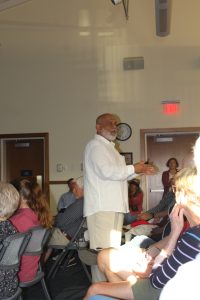
Dhiru Thadani was hired by the town of Berlin as part of the planning process. Thadani walked the crowd of more than 80 people through what was billed as a “guided conversation” on the present and future growth of Berlin.
By Cindy Hoffman, Staff Writer
(April 26, 2023) More than 80 people turned out at the Berlin Library last Wednesday night for a “guided conversation” on the present and future growth of Berlin.
“This is part of a multistage process geared toward a community-wide discussion on growth,” Mayor Zack Tyndall told the audience.
“We want it to be community-focused and look at how we can protect the integrity of this town.”
The funds used to stage the program came from American Rescue Plan Act money still in the town’s budget.
Tyndall said public opinion would help guide the town as it prepares to update its comprehensive plan, a state-required compendium of planning and growth objectives that towns and counties use to guide the zoning process.
Giving residents something to think about last Wednesday was Dhiru Thadani, an architect and urbanist who has been in practice since 1978, and who was hired by the town to walk the audience through the “guided conversation.”
As a disciple of what is known as New Urbanism, Thadani advocates a return to the once-traditional form of American development — walkable communities, mixed-use downtowns and denser housing development.
He is currently researching and documenting more than 100 American towns, including Berlin, across the country. His research looks at historical growth, street patterns, topography, density, transportation networks, accessibility, and economic drivers.
Thadani took the audience through the history of expanding suburban development and how that sprawl is not in keeping with the needs of residents today.
“Sixty percent of Americans today live in a one-to-two-person household,” Thadani said. That, he said, makes the McMansions in suburbia pretty obsolete, as “the demand today is for smaller units.”
Live-work units (properties that combine residential and non-residential uses in either commercial or residentially zoned areas) were the way America was built, he told the crowd, but that approach ended as communities separated these uses into different zoning districts and community growth spread outward.
The result, he said, is houses that are too big and expensive for most people. He went on to advise the audience that denser housing could be provided without changing the character of a small town.
One example of this, he said, is “cottage courts” that consist of a group of small detached structures arranged around a shared court visible from the street. Another would be a multi-unit building designed to reflect the architecture of older homes in the community.
Thadani also provided examples of towns that have turned vacant lots into parks or other community-enhancing places.
A big proponent reducing vehicular traffic to allow for more pedestrians. Thadani also advised residents and town officials, “Parallel parking makes streets and pedestrians safer, because people have to drive slower.”
Instead of merge lanes, he continued, creating short right turns also makes drivers stop and turn more slowly, keeping pedestrians safer. And pedestrian overpasses or road underpasses also keep everyone safer.
He also recommended changing impervious parking lots and pads to pervious materials to address flooding and to help clean the water before it hits the sewer system, and suggested installing solar panels on vacant lots at the edge of town to provide clean energy.
His vision for small communities involves a return to mixed-use development that allows residents to get everything they need within walking distance. He opined that if residents are not reliant on a car to get to work, shop, play and live, they will save on transportation costs and be able to pay a little more to live in a city or town.
